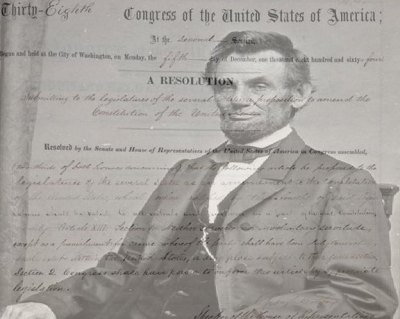What were Lincoln's accomplishments?

This year marks the 150th anniversary of Lincoln’s death. On April 15, 1865, the day he died, Lincoln was 56 years old. It had been only six weeks since his second inauguration (March 4).
The 16th president is remembered as a strong leader and author of the Gettysburg Address. His speeches are still quoted, and when historians rank presidents, Lincoln is often on top. As president, he had a list of accomplishments that paved the way for the country's expansion:
Civil War leadership, 1861-65 -- First and foremost, Lincoln is remembered as the president who kept the country together and led the North to victory during the Civil War. The war ended slavery and preserved the union. The North's success if often credited, in part, to Lincoln's skills as a leader.
The Department of Agriculture -- On May 15, 1862, Lincoln signed a law establishing the U.S. Department of Agriculture. The first commissioner was Isaac Newton, a farmer who had served as chief of the agricultural section of the Patent Office, according to the U.S. Department of Agriculture.
The Homestead Act, 1862 -- This was the first federal law granting public land to citizens or anyone about to become a citizen. According to the National Park Service, 270 millions acres, or 10 percent of the area of the United States, was claimed and settled under this act, signed by Lincoln May 20, 1862. Anyone at least 21 years old could claim 160 acres. The land was claimed by farmers without land, immigrants, single women and former slaves. Homesteaders had to build a house, live on the land and farm for five years. The filing fee -- $18 – was the only cost.
The Pacific Railway Act -- Lincoln signed this act into law on July 1,1862, launching development of transcontinental railroad and making way for the country’s westward expansion.
The Morrill Act, 1862 -- Named for Rep. Justin S. Morrill, a Vermont Republican, the government granted each state public land that was to be sold to pay for colleges specializing in agriculture, mechanics and military tactics. Lincoln signed the act into law July 2, 1862. An article on the website of one land-grant school, Virginia Tech, notes that Lincoln’s influence over the law’s passage is debatable. Even so, Lincoln, who had little formal schooling, had a long-running interest in broadening educational access.
The Emancipation Proclamation -- Lincoln issued the proclamation Jan. 1,1863. Its wording was tough and precise: “That on the first day of January, in the year of our Lord one thousand eight hundred and sixty-three, all persons held as slaves within any State or designated part of a State, the people whereof shall then be in rebellion against the United States, shall be then, thenceforward, and forever free; and the Executive Government of the United States, including the military and naval authority thereof, will recognize and maintain the freedom of such persons, and will do no act or acts to repress such persons, or any of them, in any efforts they may make for their actual freedom.”
But the proclamation was limited, the National Archives notes. “It applied only to states that had seceded from the Union, leaving slavery untouched in the loyal border states. It also expressly exempted parts of the Confederacy that had already come under Northern control. Most important, the freedom it promised depended upon Union military victory.”
The 13th Amendment -- The amendment ended slavery. ("Neither slavery nor involuntary servitude, except as a punishment for crime whereof the party shall have been duly convicted, shall exist within the United States, or any place subject to their jurisdiction.") It was passed by the Senate April 8, 1864, according to the Library of Congress. It wasn’t until Jan. 31, 1865, that the House passed the measure. Lincoln approved the joint resolution Feb. 1, 1865. It was ratified after his death, Dec. 6, 1865.
Quick Study was compiled by YT&T editors using these sources:
- The National Park Service: What was the Homestead Act?
- The National Archives: 13th Amendment to the U.S. Constitution
-
Virginia Tech : Lincoln & Morrill: Passing the 1862 Morrill Act
-
The National Archives: The Emancipation Proclamation
-
U.S. Department of Agriculture: Lincoln’s agricultural legacy
-
State Historical Society of North Dakota: Lincoln’s Legacy – Northern Pacific Railroad
- The Library of Congress: 13th Amendment to the United States Constitution
Related:
Folklore shrouds writing of Gettysburg Address
Mr. Lincoln's (diverse) neighborhood
Photo Gallery: Mr. Lincoln's neighborhood
Lincoln’s Gettysburg Address, Washington’s Mount Vernon linked
Quick Study: Presidents without diplomas

